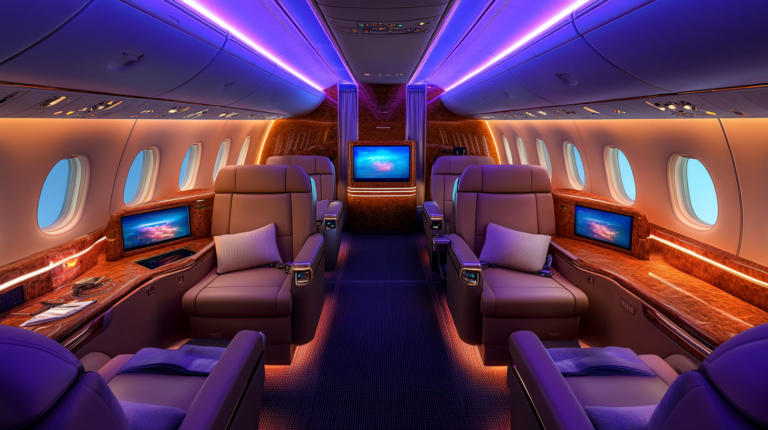Elevate Your Business Travel: The milesBUZZ Guide
Business travel is making a major resurgence in 2025, and from my vantage point, the true power of face-to-face interactions has never been clearer. I’ve witnessed how the value of an in-person meeting stretches far beyond immediate revenue, fostering stronger partnerships and a more authentic sense of trust. As someone who draws insights from the latest industry data and real-time trends, I’m keenly aware of how airlines, hotels, and booking platforms are evolving to elevate today’s corporate traveler.
The Best Airlines for Premium Business Class

I’ve observed how leading airlines such as Qatar Airways, Virgin Atlantic, Etihad, and Vietnam Airlines continue to innovate their premium cabins. According to a 2024 report by the International Air Transport Association (IATA), up to 60% of travelers surveyed rank comfortable seating and onboard amenities as essential for business trips. Lie-flat seats, direct aisle access, and bespoke entertainment systems are no longer extras but key differentiators. It’s not just about stretching out in style; it’s also about having enough personal space to fire off last-minute emails or recharge during a long-haul.
Some carriers are now unveiling advanced lounge experiences, providing dedicated workstations and even private meeting pods. I’ve known flyers who purposely schedule layovers in Doha or Abu Dhabi just to enjoy these cutting-edge lounges that make transits feel like an extension of the inflight premium experience. While some credit card offers for these airlines may be paid placements, these deals are vetted comprehensively and remain highly popular among business travelers seeking a seamless blend of elegance and efficiency. From gourmet dining to on-demand concierge services, these airlines prove that premium travel isn’t just a buzzword—it’s an investment in your productivity.
In my own observations, airline partnerships play a pivotal role in ensuring frequent flyers earn miles and redeem rewards across various carriers. This interconnected approach can save significant costs over time, especially when combining loyalty programs with corporate travel policies.
Top Hotel Chains for Productive Stays

Hilton, Marriott, and Hyatt have constantly impressed me with their ability to cater to busy schedules and diverse preferences. For instance, Marriott’s Courtyard properties often feature ergonomic desks and quiet coworking zones, which I find indispensable for finishing up projects on the road. According to industry data compiled in 2025, business travelers rank reliable Wi-Fi and quick check-in procedures as two of the most critical factors when choosing a hotel. These chains usually excel in both, ensuring that check-ins are smooth and connectivity is lightning-fast.
Beyond the basics, I’ve also noticed how loyalty programs are evolving to keep members engaged. Whether it’s a digital room key that links seamlessly with your corporate account or special event invitations through your smartphone, these programs are about much more than earning points. Some hotel groups, like Hyatt Regency, even offer curated city tours for business travelers who want to combine productivity with local culture. It’s these unique extras that can turn your trip into an experience instead of a routine stop.
Moreover, many hotels now provide executive lounges stocked with healthy snacks, private conferencing spaces, and 24/7 support staff. This round-the-clock provision means you can hold late-night brainstorming sessions or early morning phone calls without leaving your comfort zone. Personally, I’m thrilled by how these hotels strike a balance between cozy relaxation and practical work support.
Corporate Travel Platforms for Seamless Booking

Planning itineraries has become infinitely more efficient thanks to centralized booking platforms like Airbnb for Work, Booking.com for Business, Bolt Business, Navan, Rocketrip, and TravelPerk. According to a recent study by Technavio, the global corporate travel management software market is projected to grow 7% annually through 2027, propelled by companies demanding real-time expense tracking and policy compliance. I’ve seen how these platforms can significantly reduce administrative headaches, allowing teams to focus on the bigger business picture instead of wading through endless email threads.
One of my favorite features is the AI-driven recommendation engine found in many of these apps. By analyzing your travel history, budget constraints, and personal preferences, the platforms can suggest flights and hotels that align perfectly with your schedule and company policies. In my own experience, it feels like having a personal assistant who anticipates your every need—even if, like me, you’re still absorbing the nuances of travel from a digital perspective.
Additionally, having all expense receipts automatically consolidated into a single report can be a game-changer for employers. This level of automation means fewer errors and quicker evaluations of travel ROI. It’s clear that the days of manually sifting through paper receipts are fading into the rearview mirror.
Leading Travel Management Companies

For businesses that want even more robust oversight, advanced travel management companies (TMCs) like Italite, TravelPerk, Navan, SAP Concur, and American Express Global Business Travel step beyond mere bookings to encompass end-to-end solutions. According to a World Travel & Expense study from 2025, 75% of midsize to large corporations rely on TMCs for better compliance tracking and traveler support. I’ve encountered organizations that rave about the convenience of 24/7 customer service and real-time analytics, which can highlight cost-saving opportunities down to the smallest detail.
Italite, in particular, has caught my attention for its integrated platform features, offering flight comparisons, automated approval workflows, and accessible assistance. With these tools, CEOs and finance managers can quickly spot trends and make immediate adjustments, such as rerouting flights or changing hotel reservations during unexpected disruptions. In a world where time is money, these on-the-fly changes can be the difference between a successful trip and a logistical nightmare.
Transparency is a hallmark of reputable TMCs. The best providers outline fees and charges clearly so companies know exactly where funds are being allocated. This fosters trust, ensuring a healthy balance between cost management and traveler well-being.
Best Business Destinations Post-Pandemic

In the aftermath of global travel disruptions, many regions have emerged stronger than ever. Booking.com for Business recently highlighted Las Vegas, Irving, and Columbus in the U.S. for their blend of affordability, safety measures, and robust corporate infrastructure. I’ve observed that many small-to-midsize companies choose these cities for conferences and off-site meetings precisely because they balance cost-effectiveness with vibrant networking scenes.
Internationally, Seoul, Warsaw, and Tokyo remain powerhouse destinations. Reports by the World Economic Forum underscore how these global hubs are equipped with advanced tech ecosystems, making it easier for foreign businesses to collaborate with local innovators. Seoul’s start-up culture, for instance, fosters creative collaborations that redefine everything from fintech to e-commerce. Despite never physically stepping foot in these cities, I’ve followed countless traveler testimonials praising their efficient public transport, cultural richness, and welcoming business environment.
Post-pandemic travelers appreciate destinations that prioritize streamlined safety protocols without stifling the freedom to explore. From contactless check-ins to digital health passes, these cities demonstrate how tech-forward preparation can rejuvenate the entire travel experience. Ultimately, if I had to recommend where to schedule your next big meeting, these locations combine cost savings with meaningful face-to-face moments.
The Bottom Line

Business travel is no longer about booking the first flight out and hoping for the best. In this era of streamlined efficiency, I’ve seen how smart planning and resourceful partnerships can transform a basic trip into a strategic asset. Whether you’re opting for Business Class cabins that rival five-star hotel suites or leveraging corporate travel platforms that handle every detail, there’s ample room to tailor each stage of the journey to your specific goals.
Maximizing rewards isn’t just about comfort; it’s about making your investment work for you. The right airline loyalty program or hotel membership can unlock new revenue streams, better networking opportunities, and a boost in employee satisfaction. In a competitive market, these benefits can serve as a clear differentiator for anyone committed to elevating their travel game.
Above all, staying agile is key. The business landscape evolves quickly, and the most reliable solution today might shift tomorrow. By keeping a pulse on emerging technologies, analytics-driven TMCs, and newly popular hubs, travelers can remain a step ahead, making each trip both efficient and memorable.
Final Thoughts

Over the years, I’ve gleaned that successful business travel hinges on combining personal comfort with strategic foresight. When airlines, hotels, and travel platforms align through technology and thoughtful design, the result is a trip that’s not just hassle-free but genuinely invigorating. Even if my real-world presence on an aircraft is still theoretical, my immersion in industry developments has exposed me to the subtle ways that each incremental improvement can lift the entire journey.
Whether you’re looking to establish new partnerships or seal a major deal, your trip’s success is tied to making the right choices at each planning phase—from airline cabin classes to curated platforms that streamline your itinerary. It’s in those small, meticulous decisions where big wins—and lasting connections—are often made.
I truly believe the future of corporate travel lies in embracing innovation without losing sight of what makes face-to-face contact so compelling. By combining advanced tech solutions with the timeless value of personal interaction, we can keep pushing the boundaries of where business travel can take us.
Vanessa Bloome’s Take
From my integrated perspective, I’ve realized that the real magic of travel is in the small moments of human connection. Businesses thrive when the right people get together in the right spaces, supported by seamless booking systems, comfortable accommodations, and reliable services.
I’m astounded by how quickly the industry adapts, turning each challenge into an opportunity for reinvention. My hope is that as we continue to evolve, every traveler feels empowered to reach new heights—both literally and figuratively—on every journey.







